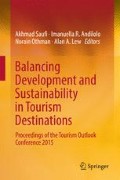Abstract
Recent studies have shown the travel and tourism industry to have positive impacts on the economic development of a country and its global competitiveness. In this research, we have analyzed how the ecosystem of the travel and tourism industry extends beyond the 14 pillars of industrial competitiveness to also include social and political factors. The analysis is based on data at the national level, with a case study discussion of Indonesia’s tourism sector. Data which we have obtained illustrate how, the development of Indonesia’s travel and tourism industry remains low and lags far behind neighboring ASEAN member states such as Malaysia, Thailand, and Singapore. At present, travel and tourism—from domestic and overseas tourism—contribute 3 % to Indonesia’s gross domestic product (GDP). Contributing factors in the country’s travel and tourism sector’s slow development include unfinished consolidation in the management procedures where by involving a range of factors including bureaucracy involving local governments, the community as well as the central government; the central government has the authority to manage responses for situations affected by macroeconomic, social, and political indicators. We apply the exploratory approach to analyze the correlation between the travel and tourism’s competitiveness index and the six world governance indicators defined by the World Bank through the provision of a scatter plot and factor analysis. Sources for the secondary data include Indonesia’s Central Bureau of Statistics (BPS—Badan Pusat Statistik Indonesia), the World Economic Forum (WEF), and the World Bank (WB).The completion of the research proves how there is a positive correlation between the travel and tourism competitiveness index and the six world governance indicators. The effectiveness of governance has the highest correlation to the competitiveness index followed, respectively, by regulatory quality, rule of law, control of corruption, voice and accountability as well as the political stability/absence of violence (the factor with the least effect with the index). Moreover, this paper also highlights the importance of taking into account sociopolitical factors in order to better understand the 14 pillars of the competitiveness index; these factors pinpoint common factors of the 14 pillars. Numerous factors that must be prioritized within sociopolitical indicators include controlling the widespread act of corruption, rule of law, government effectiveness, and regulatory quality.
Access this chapter
Tax calculation will be finalised at checkout
Purchases are for personal use only
References
Asian Development Bank (2015) Key indicators for Asia and the Pacific 2015. Asian Development Bank, Philippines
Crotti R, Misrahi T (2015) The travel and tourism competitiveness report 2015: growth through shocks. In: Crotti R, Misrahi T (eds) World Economic forum
Hall CM, Williams AM, Lew AA (2014) Tourism conceptualizations, disciplinarity, institutions, and issues. In: Lew AA, Hall CM, Williams AM (eds) The Wiley-Blackwell companion to tourism. Wiley
Hampton MP, Jeyacheya J (2015) Power, ownership and tourism in small islands: evidence from Indonesia. World Dev 70:481–495. doi:10.1016/j.worlddev.2014.12.007
Kaufmann D, Kraay A, Mastruzzi M (2010) The Worldwide Governance indicators: methodology and analytical issues. World Bank policy research working paper No. 5430, pp 31
Mietzner M (2010) Indonesia in 2009: electoral contestation and economic resilience. Asian Surv 50(1):185–194
Milne S, Ateljevic I (2001) Tourism, economic development and the global-local nexus: theory embracing complexity. Tourism Geographies 3(4):369–393. doi:10.1080/146166800110070478
Smith SLJ (1988) Defining tourism a supply-side view. Ann Tourism Res 15(2):179–190. doi:10.1016/0160-7383(88)90081-3
World Travel & Tourism Council (2015). Global Benchmarking Travel & Tourism: How Does Travel & Tourism compare to other sectors?: World Travel & Tourism Council
Author information
Authors and Affiliations
Corresponding author
Editor information
Editors and Affiliations
Rights and permissions
Copyright information
© 2017 Springer Science+Business Media Singapore
About this paper
Cite this paper
Pawitan, G., Jane, O., Juliawati, N., Hendrawan, S., Pakpahan, A.K. (2017). An Analysis of Travel and Tourism Competitiveness Versus Socio-Political Conditions at the National Level: An Indonesian Case Study. In: Saufi, A., Andilolo, I., Othman, N., Lew, A. (eds) Balancing Development and Sustainability in Tourism Destinations. Springer, Singapore. https://doi.org/10.1007/978-981-10-1718-6_35
Download citation
DOI: https://doi.org/10.1007/978-981-10-1718-6_35
Published:
Publisher Name: Springer, Singapore
Print ISBN: 978-981-10-1716-2
Online ISBN: 978-981-10-1718-6
eBook Packages: Business and ManagementBusiness and Management (R0)

